#carol j. clover
Explore tagged Tumblr posts
Text

#men women and chain saws#carol j. clover#nonfiction#book poll#have you read this book poll#polls#requested
55 notes
·
View notes
Text

men, women, and chainsaws – carol j. clover
[TEXT ID: (the hero part always understood as implying some degree of monstrosity)]
389 notes
·
View notes
Text
“One of the most disturbing things about I Spit on Your Grave, I think, is its almost perverse simplicity. The men are not odd specimens but in the normal range of variation; their acts of brutal rape are not traced to dysfunctional upbringing (no Mother Bateses here); Jennifer takes the revenge she does not for deep-seated psychological reasons but because it is the punishment that fits the crime; there are no extenuating circumstances; the law is not involved, nor are legal questions raised; and there is no concern whatever, not even at the level of lip service, with moral and ethical issues. In short, I Spit on Your Grave offers no outs; it makes no space for intellectual displacement. [...]
I Spit on Your Grave shocks not because it is alien but because it is too familiar, because we recognize that the emotions it engages are regularly engaged by the big screen but almost never bluntly acknowledged for what they are.”
--Carol J. Clover, from Men, Women and Chainsaws (1992)
#carol j. clover#carol j cover#men women and chainsaws#horror#film theory#i spit on your grave#rape revenge#horror cinema#op
86 notes
·
View notes
Photo

Men, Women, and Chainsaws by Carol J. Clover
Pretty Little Liars: Original Sin: "Chapter Six: Scars"
26 notes
·
View notes
Text
Friday the 13th

I thought I had reviewed all of the Friday the 13th movies, but after showing Sean S. Cunningham’s original FRIDAY THE 13TH (1980, On Demand) to a friend who’d never seen it, I discovered I hadn’t done the first or the second. This was the latest of many viewings of one of the original slashers, and this time, watching with someone else, I noticed some things:
The film obviously borrows heavily from John Carpenter’s HALLOWEEN (1978), most notably with an opening murder set in the past, though Cunningham’s film provides no shocking revelation of the killer (that was saved for later) and provides the keys to a more concrete motive.
The big mistake in that opening sequence is partly shared with some scenes in HALLOWEEN. It starts with what seems to be a subjective camera shot that isn’t. Later, when it finally becomes a subjective shot with the killing of the two camp counsellors, Cunningham makes a mistake of his own. He breaks the tension by switching to an objective shot as the first counselor is killed.
Until my friend pointed it out, I hadn’t realized how androgynous the final girl (Adrienne King) is. Her short hair may have been intended to contrast with the female victims, and of course, it was the popular Dorothy Hamill cut of the period, but it also creates an intriguing sexual ambiguity that helps support Carol J. Clover’s contention in MEN, WOMEN AND CHAINSAWS: GENDER IN THE MODERN HORROR FILM that the final girl derives her power from her virginal, almost asexual status.
The final battle is a rarity for the period in depicting two women going at it hammer and tongs without a man as the source of contention. Yes, I know Jason’s death motivates the film, but they’re not exactly fighting over him.
I still maintain the best ending for the film would be for the final girl’s mother to come into her hospital room and be played by Betsy Palmer. Yes, it would mean there wouldn’t be any sequels (“Big loss,” I hear some of you saying sarcastically), but it would provide a much more interesting note of ambiguity. Or have I been watching too many gialli?
3 notes
·
View notes
Text
Critical Project: Empowerment in Horror
youtube
Introduction
“…the majority audience, perhaps even more than the audience for horror in general, was largely young and largely male-conspicuously groups of boys who cheer the killer on as he assaults his victims, then reverse their sympathies to cheer the survivor on as she assaults the killer. Young males are also, I shall suggest, the slasher film's implied audience, the object of its address.” (Corrigan 514)
“Between 1974 and 1986, however, the formula evolved and flourished in ways of some interest to observers of popular cul-ture, above all those concerned with the representation of women in film.” (Corrigan 516)
Due to an increased awareness/acknowledgment of female horror fans, the portrayal of female characters has developed into one that is more respectful and empowering.
How Annihilation Subverts the tropes of the Final Girl:
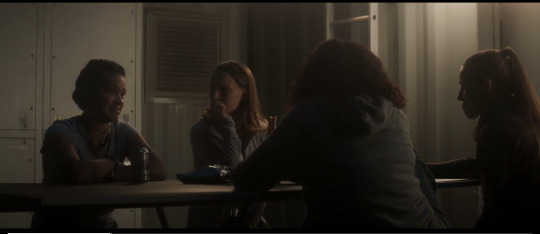
“…the victim is eternally and prototypically the damsel.” (Corrigan 516)
In Annihilation the crew that embarks on the journey is made up of specialist and veteran women who desire to learn more about the phenomena. They are not damsels in distress but scientists who hunger for answers. (Garland, Annihilation, 21:05-24:08)
Dr. Ventress - psychologist (team leader)
Cassie Shepard - Geomorphologist
Josie Radek - Physicist
Anya Thorensen - paramedic
Lena Double - Biologist
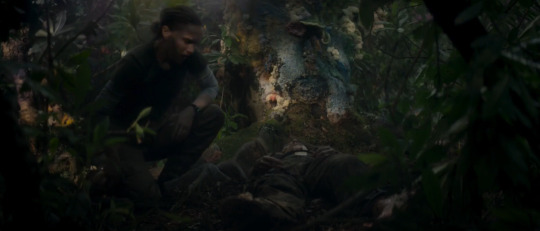
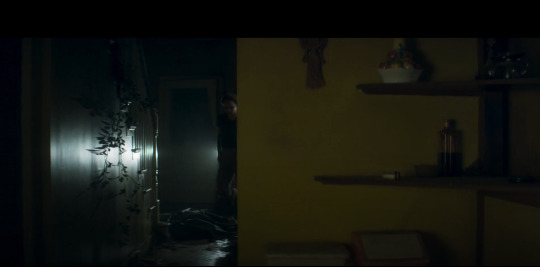

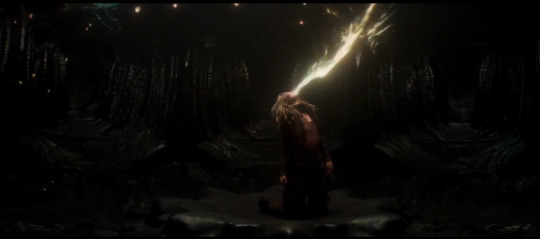
“…a blatantly phallic murderer, even gurgling orgasmically as she dies.” (Corrigan 516)
The deaths in Annihilation (focusing on the female team) occur both on and off screen. The first death occurs off screen. Cass Sheppard is found in the forest by Lena Double where her body is mutilated but not in a sexual manner. Her throat is bit open exposing gore that makes the viewer turn away in disgust. However, Sheppard is left closed with eyes staring wide at the sky above. The second death is brutal and quick as Anya Thorensen is mauled by the bear-human hybrid. Her face is torn in half leaving gore and the character once again staring wide eyed at the ceiling. The third death occurs off screen but is not as violent or as shocking as the others. Josie Radek accepts the metamorphosis she is undergoing within the shimmer and becomes one of the humanoid plants sprawled across the village. The fourth and final death of the female scientist occurs within the center part of the creature controlling the shimmer. The lead scientist, Dr. Ventress accepts her death and is evaporated by the light being expelled from her body. Non- of the deaths should arouse desire or satisfaction form viewers. They can either be brutal or beautiful but they are not sexual.
(Garland, Annihilation, 1:02:03-1:02:3) [Shepard]
(Garland, Annihilation, 1:16:20-1:16:50) [Thorensen]
(Garland, Annihilation, 1:18:40-1:21:39) [Radek]
(Garland, Annihilation, 1:30:26 - 1:33:30) [Ventress]

“As E. Ann Kaplan sums it up, "within the film text itself, men gaze at women, who become objects of the gaze; the spectator, in turn, is made to identify with this male gaze, and to objectify the woman on the screen; and the camera's original 'gaze' comes into play in the very act of filming." (Corrigan 517)
Because the main character is female the story is told from her perspective allowing the gaze to be her own. During one of the flashbacks (affair scene) Portman's character is shot from behind around eye level. Her back and face are shown in two separate shots showing her dominance in the bedroom and within the affair. She is in control. Her character is not sexualized as other female leads are in other horror movies (full body shots, breast exposed, loud orgasmic screaming) she is quietly pleasing herself while also dealing with the inner turmoil her actions have caused her. (Garland, Annihilation, 29:05 - 29:25)
“She is introduced at the beginning and is the only character to be developed in any psychological detail. We understand immediately from the attention paid it that hers is the main story line.” (Corrigan 518)
The other characters (Kane, other female leads) receive development as the story progresses allowing the audience to empathize and mourn each.


“When De Palma says that female frailty is a predicate of the suspense genre, he proposes, in effect, that the lack of the phallus, for Lacan the privileged signifier of the symbolic order, is itself simply horrifying, at least in the mind of the male observer.” (Corrigan 521)
Although it is brought to attention the limited strength of the female characters (gun pickup scene). The characters are proven to be capable of protecting themselves when the situation calls for it. (Portman scenes shooting the alligator at eye level). (35:40) (Garland, Annihilation, 36:08-36:38)

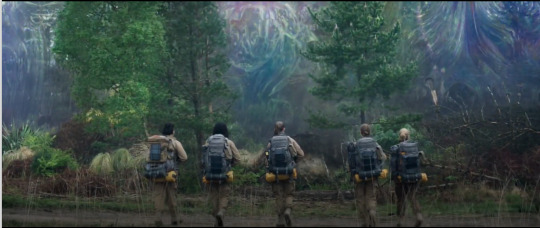
“The cinematic gaze, we are told, is male, and just as that gaze "knows" how to fetishize the female form in pornography (in a way that it does not "know" how to fetishize the male form) so it "knows," in horror, how to track a woman ascending a staircase in a scary house and how to study her face from an angle above as she first hears the killer's footfall.” (Corrigan 521)
The characters are not hypersexualized in the film. They are allowed to have messy buns and wear baggy clothes because they are meant to survive. (Garland, Annihilation, 27:38 - 28:57)
“…boyish: because they are transformed males.” (Corrigan 522)
Although they do take the place of the ale team they are not reflections of them. The women have their own reasons for entering the shimmer and are able to progress to the end (two of them)
“…victim-hero…” (Corrigan 526)
None of the women are victims because they chose to enter the shimmer and continued forward knowing the danger.



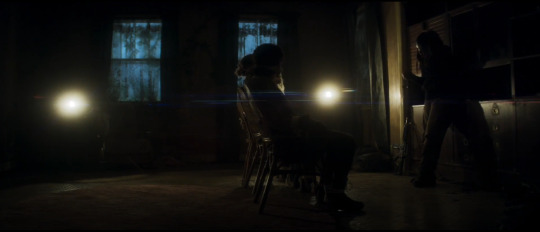
“Abject terror, in short, is gendered feminine…” (Corrigan 522)
Most of the women are stoic throughout the film or show some moments of weakness but they are not screaming and sobbing throughout the film. They work to survive. (Garland, Annihilation, 44:35-47:08)
(Garland, Annihilation, 1:10:56 - 1:14:30) Madness scene
How annihilation fulfills the trope of the final girl described by Clover:
“Brian De Palma elaborates:…you fear more for her than you would for a husky man."(Corrigan 516)
Hitchcock…'Torture the women!' The trouble today is that we don't torture women enough.” (Corrigan 516)
The team of women in Annihilation suffer both grotesque physical and psychological changes due to their time in the shimmer. The audience is disturbed by their suffering and sympathizes with their struggles. However, the horror is not solely experienced by them. As the film progresses the viewer learns about the fate of the Male team which acts as a catalyst to the true horror of the shimmer.
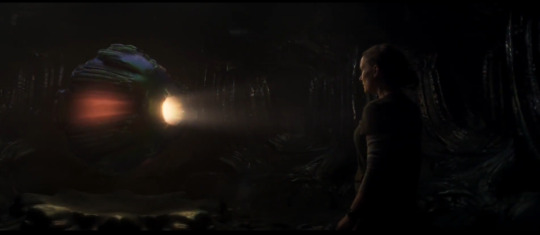
“The killer is often unseen or barely glimpsed, during the first part of the film, and what we do see, when we finally get a good look, hardly invites immediate or conscious empathy.” (Corrigan 518)
Because it is not humanoid, the entity controlling the shimmer creates no connection with the viewer. Only confusion and fear.
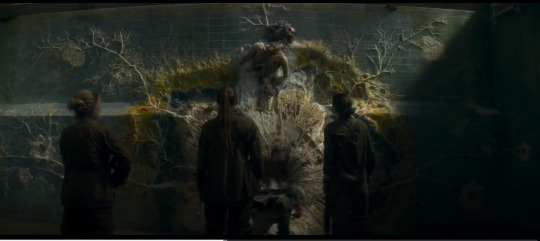
“No male character of any stature lives to tell the tale.” (Corrigan 518)
None of the male team survives to explain their experience in the shimmer. All that remains is the footage they recorded. (Garland, Annihilation, 47:28-48:55)
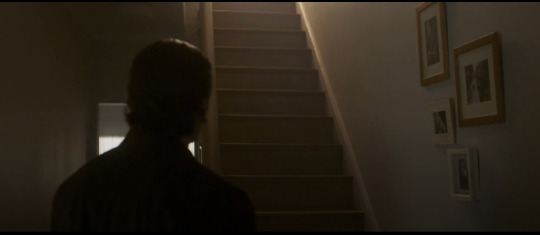
“-we see through his eyes and (on the soundtrack) hear his breathing and heartbeat.” (Corrigan 518)
Beginning shot of Kane's clone returning home. But it is brief and Pormans characters perspective is the one we focus on. (Garland, Annihilation, 6:27-7:30)

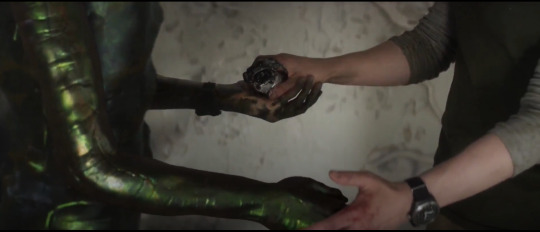
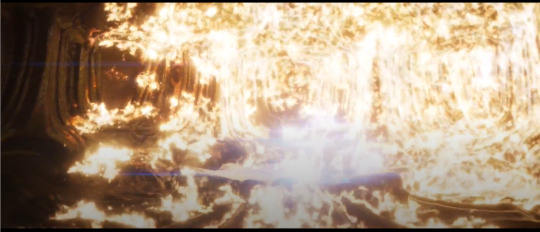
“The last point is the crucial one: the same female body does for both. The Final Girl (1) undergoes agonizing trials, and (2) virtually or actually destroys the antagonist and saves herself.” (Corrigan 524)
The body shifts due to shimmer, the psychological torment Portman's character faces due to her guilt and experience in the shimmer as well as her battle against her clone in the heart of shimmer qualifies her for 1. The destruction of the shimmer through the clone is 2.
“At the moment that the Final Girl becomes her own savior, she becomes a hero; and the moment that she becomes a hero is the moment that the male viewer gives up the last pretense of male identification.” (Corrigan 524)
By burning the shimmer, Portmans character is able to do the thing her husband, Kane, could do, essentially making her the final girl. However she is ultimately changed forever.
Sources
“Annihilation.” Box Office Mojo, https://www.boxofficemojo.com/release/rl1057129985/.
Clover, Carol J. Her Body, Himself Men, Women, and Chain Saws: Gender in the Modern Horror Film. 1992. Princeton University Press. In Critical Vision in Film Theory (2011). Corrigan, et al. Bedford/St.Martins, p. 511-530
“The Most Surprising Horror Movie Statistics and Trends in 2023 • Gitnux.” GITNUX, 13 Mar. 2023, https://blog.gitnux.com/horror-movie-statistics/.
Published by Statista Research Department, and Jan 5. “U.S.: Horror Films' Popularity by Gender 2022.” Statista, 5 Jan. 2023, https://www.statista.com/statistics/1342707/horror-movies-theater-viewing-gender-united-states/#:~:text=As%20of%20October%202022%2C%20approximately,added%20up%20to%2021%20percent.
Annihilation. Directed by Alex Garland. Performance by Natalie Portman Jennifer Jason Leigh, Gina Rodriguez, Tessa Thompson, Tuva Novotny, and Oscar Isaac. Paramount Pictures. 2018. Film
0 notes
Text

men, women, and chainsaws
196 notes
·
View notes
Text

980 notes
·
View notes
Text
i hate midsommar so much call dani a final girl again and im pushing you off the murder cliff
#WORDS MEAAAAAAN THINGS WE FUCKING READ CAROL J CLOVER FOR THIS CLASS AND YOURE CALLING DANI A FINAL GIRL#SHE NEVER CONFRONTS THE HORROR!!! SHE IS NEVER TRANSFORMED!!! SHE IS ALWAYS A VICTIM!!!!!!#kora.txt#sorry if you like midsommar i am sick of it due to the academia on it in this class. and its overrated
84 notes
·
View notes
Text

kiss the creature into me please
5 notes
·
View notes
Text
this one tumblr post really got to me i still think about it and get really mad cuz it was something like, "80s horror director all need to say sorry women and you're welcome gay people"
i like dont even know what 2 say about that
sometimes im like maybe there's no fixing this maybe i just beat you bloody maybe i just beat u into a paste
0 notes
Text
how dare you put that on my dash. i trusted youuuu
0 notes
Text

980 notes
·
View notes
Text

men, women, and chainsaws – carol j. clover
[TEXT ID: "Tortured survivor" might be a better term than "hero."]
#BRUCE#bruce who doesnt see himself as a hero to millions but instead just a man trying his best to help....#like.#his entire life is him trying to make up for not dying as a child and being the person he needed most on the darkest night of his life.#he survived. even when he didn't want to. and now hes going to use his entire life to guarantee others get to still have theirs.#cryptcites#bruce wayne#men women and chainsaws#carol j. clover
390 notes
·
View notes
Text
“The eyes on promotional posters and videocassette boxes are in the great majority of cases threatened, frightened eyes--commonly a woman’s eyes reaching in horror at a poised, bloody knife, an advancing shape, or something off-poster or off-box. ‘One of the most frequent and compelling images in the horror film repertoire,’ writes J.P. Telotte, ‘is that of the wide, staring eyes of some victim, expressing stark terror or disbelief and attesting to an ultimate threat to the human proposition.’ A standard moment in horror is one in which a person is caught by surprise--her vision assaulted--by the sight of things she does not want to see. Laurie in Halloween, for example, who looks into a closet only to see the dead body of her friend staring her in the face. And as Telotte points out, the effect is maximized by the reversal of the normal sequence in such a way that the reaction comes first. Over and over, horror presents us with scenarios in which assaultive gazing is not just thwarted and punished, but actually reversed in such a way that those who thought to penetrate end up themselves penetrated.”
--Carol J. Clover, from Men, Women and Chainsaws (1992)
#carol j. clover#carol j clover#men women and chainsaws#horror cinema#horror#film theory#halloween#op#slasher#the eye of horror#film writing
31 notes
·
View notes
Text












FINAL GIRLS of HORROR
The final girl is a trope in horror films and refers to the last girl(s) or woman alive to confront the killer, ostensibly the one left to tell the story. The term was coined by Carol J. Clover in her article "Her Body, Himself: Gender in the Slasher Film" (1987).
Check out my Final Girls list on Letterboxd!
@lgbtqcreators creator bingo: favorite character + media from north america + final girl + characters of color
#horroredit#mygif#userbeckett#usercleo#horrortvfilmsource#junkfooddaily#filmedit#horrorwomensource#userriel#userraffa#userairi#usermaguire#useralien#userbrittany#userveronika#userbbelcher#user_sammy#userhann#chaoticroad#flashing gif
476 notes
·
View notes
Text
The original meaning of the term "Final Girl," from 1987's "Her Body, Himself: Gender in the Slasher Film" by Carol J. Clover, was "a woman who is a sole survivor of a group who are chased by the villain, and who gets the final confrontation with said villain [whether she wins or not is not considered] because of some implied moral superiority." As an example, Jamie Lee Curtis's character of Laurie Strode in 1978's Halloween is the sole survivor of the teenagers that Michael Myers hunts, and gets the climactic scene with him, though she's not the one who defeats him. Her character is the only one of her friend group who does not (onscreen at least) partake in drugs, alcohol or sexual activity.
The term "final girl" has expanded over the years, often losing the moral superiority clause (see: Sidney Prescott in Scream, Maxine in X) or having other survivor(s) so long as the girl gets the final confrontation (the sisters in the recent Scream movies, Dana Polk in Cabin in the Woods). The most common deviation is losing the moral superiority clause, with the characters either being just as moral as their group or even being morally in the wrong but still surviving as a subversion or deconstruction of the trope. A common addition is a prior connection to the villain, though this is not necessary.
With all that being said,
As always, Girl is a gender-neutral term when it comes to having fun. I decided not to count Knuckles because we don't know his full backstory in-game and the word-of-god answer is that his species died of disease, and also because he'd be the funny answer everyone would pick immediately so that doesn't count guys.
Important Notes to Consider:
Tikal:
Last Survivor: Somewhat. Other echidnas seem to have survived Chaos's attack, but Tikal was the last character alive shown onscreen, and the only other named characters in her time period did not survive.
Final Confrontation: Applies. She is the one to seal Chaos into the Master Emerald.
Moral Superiority: Applies. She's the only one in her tribe willing to stand up to her warmongering dad.
Shadow:
Last Survivor: Applies. While some people seem to have escaped the ARK massacre (like the Commander), all other named characters are either killed or captured and killed afterwards.
Final Confrontation: Debatable. There isn't actually a singular monster attacking the ARK, instead it's the entire military. Shadow however does get a confrontation with the Biolizard and later with Black Doom. Do they count for this though? You decide.
Moral Superiority: Not Applicable. Shadow isn't inherently morally above or below the other people on the ARK who died.
Cosmo:
Last Survivor: Mostly Applies. She is the last survivor specifically of her species. Everyone else in the Sonic Crew survives to the final confrontation, but her species is toast.
Final Confrontation: Applies. Cosmo is the last to interact with Dark Oak in the initial genocide, and the one to eventually defeat him (along with Tails, but really it was Cosmo's sacrifice that actually killed him).
Moral Superiority: Not Applicable. The rest of her species are portrayed as innocent and undeserving of their fate, and her survival was purely due to her fear making her accept a deal with Dark Oak and the implication that he's her father.
Silver:
Last Survivor: Mostly Applies. He and Blaze are the only seen survivors of Iblis's assault. Blaze absorbs Iblis and dips, but Silver does have a fight with Solaris in the final ending.
Final Confrontation: Somewhat. Blaze and Silver both boss fight Iblis, and Blaze gets the final confrontation and defeat. However, Silver partakes in the defeat of Solaris, who technically is Iblis.
Moral Superiority: Not Applicable. Silver isn't given moral superiority towards anyone who dies.
Sonic Forces Avatar:
Last Survivor: Somewhat. Avatar is the last survivor of their village due to them fleeing from Infinite. They join up with a group following this and assist Sonic in defeating Infinite.
Final Confrontation: Somewhat. Sonic is also there.
Moral Superiority: Debatable. Like Cosmo, the other civilians are portrayed as innocent and Avatar only escapes due to their perceived cowardice. They are shown to be Extra Special Besties with Sonic which helps them defeat Infinite through the power of Love, so that may count?
Whisper:
Last Survivor: Mostly Applies. Whisper is the last Diamond Cutter after Mimic kills her entire squad and betrays them. She goes solo until eventually confronting Mimic and then helping found a reformed Diamond Cutters.
Final Confrontation: Debatable. Mimic is still an active threat in the comics, but Whisper did get a climactic confrontation with him in Tangle & Whisper.
Moral Superiority: Not Applicable. Whisper only survived because Claire requested she stay behind due to her intuition.
Sonic in '06 specifically:
Last Survivor: Mostly Applies. Sonic is the only character who remembers that the '06 timeline occurred, making him the technical only survivor of its events. Ignore the fact he died at one point, he got better.
Final Confrontation: Mostly Applies. Sonic leads the attack against Solaris in the Final Boss fight, but Elise is the one to blow out the candle and reset the timeline.
Moral Superiority: Debatable. All the other characters are "heroes" but Sonic is the Biggest Best Hero Of Them All That The Chaos Emeralds Love Soooo Much, and he also is the one to selflessly insist on the timeline reset so that the whole Solaris Destruction Thing never happens.
#sonic the hedgehog#sth#final girl#tikal the echidna#shadow the hedgehog#cosmo the seedrian#cosmo the metarex#silver the hedgehog#sonic forces#whisper the wolf#sonic 06#sonic idw#sonic adventure#sonic adventure 2#sonic x#mine
180 notes
·
View notes
Text

980 notes
·
View notes
Text




momo ayase & final girl-isms. "Her Body, Himself: Gender in the Slasher Film" by Carol J. Clover
107 notes
·
View notes